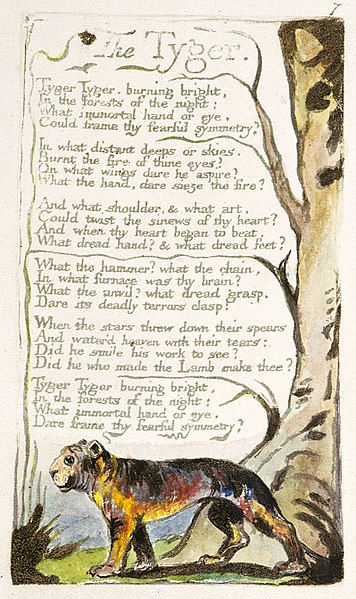
I've recently been reading William Scott Wilson's translation of Miyamoto Musashi's Go Rin no Sho ("The Book of Five Rings"). Thus far, I have really enjoyed it because I think Mr. Wilson takes a much more precise approach than some of the "interpretations" done by other authors. I have taken very much from some of the more "elemental" passages about martial arts as a way of training and a way of life, but I must admit, I have taken somewhat less from some of his more technical discussions of swordsmanship.
This is not because of some problem with Musashi's writing. I'm sure what he says is very informative... if viewed in the proper context, which I do not have, since I have never had my hands on Miyamoto Musashi, nor any exponent of his style.
The whole problem makes me think of William Blake's poem "The Tyger".
Let me start by saying that I really like this poem. I think it is a really concise, powerful meditation on the existence of evil in the hearts of men. I think it is one that employs powerful, emotive imagery.
... but there is something missing.
Some people don't know that along with being a skillful poet, William Blake was also a master engraver. He accompanied many of his poems with illustrative prints. "The Tyger", taken from his "Songs of Experience", is no exception.
To give you a bit of background, this poem was penned in 1794. Many people in Blake's native England had heard of a tiger, but very very few (ostensibly including Blake) had ever seen one. If you look at the above image, you'll see that it has all the proper characteristics of a tiger... four feet, stripes, a tail, and claws... but we all agree that something is missing. Somehow, despite the fact that Blake correctly executed the "tiger making" characteristics, his lack of real experience left Blake unable to convey the "soul" of what a tiger really looks like.
The reason I think this is relevant to my discussion of the Book of Five Rings is because I think many of us, as readers, are in a similar position to Blake and the people of England who had never had personal experience with a tiger. While we agree on many of the characteristics, lacking that "real knowledge", our picture is somehow inevitably skewed and never quite right... and this is obvious to anyone that really knows what the real deal is.
Among people who train in a common system of martial arts, have common vocabulary, and have a schematic through which to understand, I think technical discussions in the written word can be enormously helpful... but among people with no common experience, I think there will inevitably be a somewhat substantial "communication gap".
Which leads me to my conclusion. You can't learn martial arts from a book. I've known a number of people who have bragged to me about all the videos they have watched and the books they have read, and I always end up asking them the same question: what have you actually done? Without that direct contact with someone that "knows", and the feedback that comes from it, I do not believe people can learn something as highly technical as a martial arts system.
If real practice is the soil a plant grows in, books are just the fertilizer. (Feel free to insert your own "B.S." joke at this point.)
To Musashi's credit, he realized the same thing and stated as much in his book. He directly states that this his is an "oral tradition", meaning that it has to be passed down person to person - not through a book.
... so at least we're all on the same page.